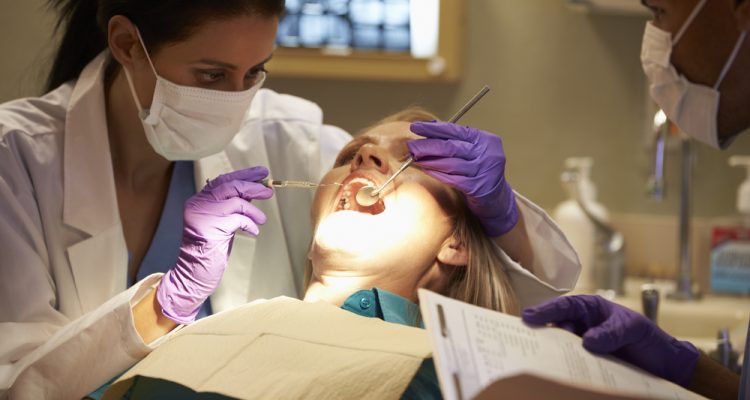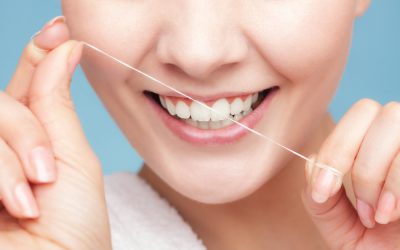Are you someone who dreads going to the dentist and wants to do it as few times a year as possible? If so, you’re not alone. And as much as you may despise the dentist, getting regular dental exams is one of the most beneficial steps you can take to protect the health of your mouth and teeth.
The purpose of a dental exam is to provide proactive, preventative care. During an appointment, your dentist checks for current oral problems or developing problems that could worsen without fast care. Many early cases of cavities and gum disease have no pain or symptoms, so you may not realize something is wrong until you’re hit with a ton of mouth pain. But early identification and treatment can resolve mild issues before they become big, big problems.
The secret to seeing your dentist less is practicing better oral hygiene – like twice-daily brushing and daily flossing – at home. The healthier your mouth is, the less your dentist has to worry about it! Keep reading to learn some helpful guidelines on what you can expect at your next appointment and how often you need to see your dentist.
What Should I Expect at My Appointment?
Your dentist packs a lot into one dental exam. During the short time you’re in the hot seat, you’ll receive a thorough evaluation to ensure that your teeth, gums and mouth are healthy and problem-free. You can expect the following at your routine check-up:
1.) A deep cleaning. Even with vigilant at-home care, your toothbrush and floss aren’t enough to prevent all build-up of plaque in your mouth. Additionally, plaque build-up may harden and form tartar deposits that can only be removed by professional tools. A deep cleaning removes tartar and thoroughly scrubs all the nooks and crannies between your teeth and gum line to leave you with a sparkling smile.
2.) An oral exam. During the oral exam, your dentist will examine your mouth for signs of cavities, gum disease, bad breath (halitosis) and other oral issues. You may need to have X-rays taken, so your dentist can spot any problems that aren’t visible to the human eye. X-rays are particularly helpful for revealing decay between teeth, gum disease, cysts, abscesses, tooth impaction, tumors and jawbone abnormalities.
3.) An oral cancer screening. During the examination portion of your appointment, your dentist will also check for signs and symptoms of oral cancer. He or she will be on the lookout for common symptoms like mouth sores, red or white patches, lumps or growths, loose teeth, swollen lymph nodes and bad breath. Your dentist may also ask you if you’ve experienced recent oral pain, mouth numbness, or difficulty and pain while speaking, chewing or swallowing. Cancer screenings are especially important because early stages of oral cancer may not present with pain or visible symptoms. The earlier cancer is identified and diagnosed, the better chances you have of completing successful treatment.
4.) Q & A time. You may only see your dentist once or twice a year – don’t be shy about asking questions related to your oral health or discussing any issues you’ve had since your last appointment. It’s also a good idea to update your dentist on recent changes that could affect your oral health, like a diagnosis of a medical condition like diabetes or heart disease.
How Often Do I Need to See My Dentist?
There’s not one correct answer that applies to everyone. Your oral hygiene habits, overall health and medical history all affect how many times a year you need to see your dentist. If you have good oral health at multiple dentist visits and you practice vigilant oral hygiene at home, you’ll probably need to make an appointment twice a year (every 6 months) for a cleaning and exam. Some people may only need to see their dentist once a year, but always wait until your dentist gives the OK before cutting down on your appointments.
People who are at higher risk for developing oral disease like cavities, gum disease and infections may need more frequent visits every 3-4 months. High-risk patients include:
- Pregnant women
- People who smoke
- People with chronic conditions like heart disease or diabetes
- People with chronic dry mouth
- People who have cancer and are undergoing cancer treatments
- People who are HIV positive
- People with a history of gum disease or cavities
Additionally, you may need more regular check-ins if you’re currently undergoing treatment for gum disease or an oral infection.
Call Boyett Family Dentistry to Schedule Your Next Appointment
Are you up to date on your visits? If it’s been longer than 6 months or a year since you’ve had a dental exam, there’s no better time to call than right now. Schedule appointments for yourself and the entire family by calling 863-294-9200 or reaching out online.





